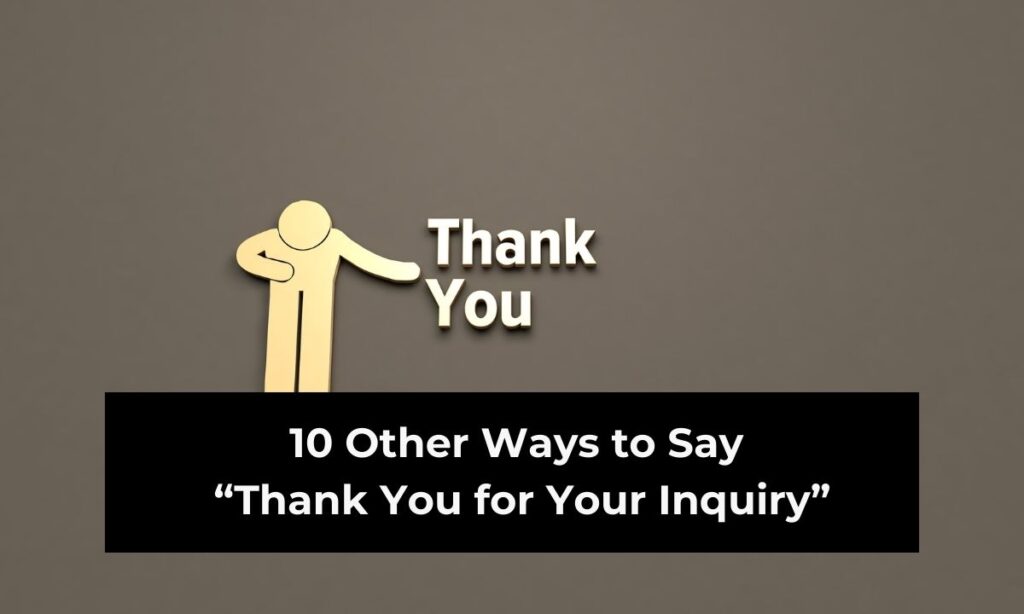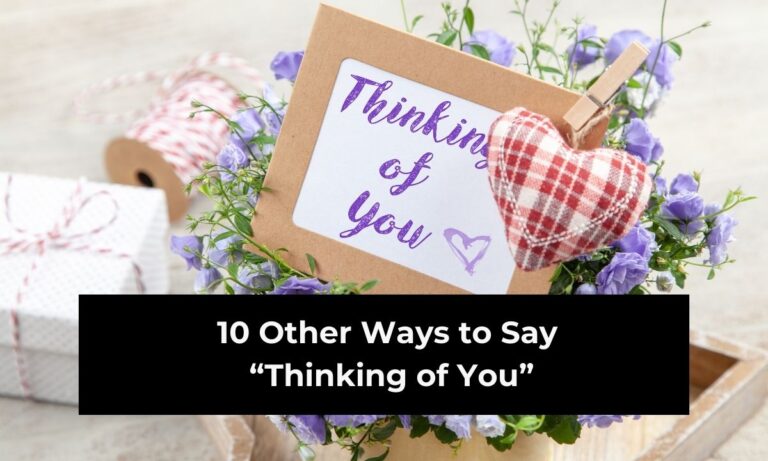When someone reaches out to you with a question, request, or interest in your services, the way you respond sets the tone for your relationship. A simple “Thank you for your inquiry” may be polite, but it often feels too standard or transactional. If you want to stand out, build trust, and create a lasting impression, you need to find more thoughtful and creative ways to express gratitude.
Think of it this way—when a potential client or customer contacts you, they’re not just asking a question. They’re showing interest in your work, your brand, or your expertise. Your reply is your chance to not only acknowledge their message but also to show warmth, professionalism, and a genuine willingness to help.
If you’re looking for better ways to say “Thank you for your inquiry,” you’re in the right place. In this guide, you’ll find 12 unique alternatives you can use in emails, messages, or even face-to-face conversations. Each phrase comes with explanations and examples so you can adapt them naturally to your situation.
Whether you’re in customer service, running your own business, or simply handling personal communications, these alternatives will help you respond in a way that feels authentic and welcoming. Instead of sounding robotic, you’ll come across as approachable and thoughtful—qualities that people remember and appreciate.

Ready to upgrade your responses? Let’s explore 12 other ways to say “Thank you for your inquiry” that add personality, sincerity, and professionalism to your communication.
1. “I Appreciate You Reaching Out”
This phrase conveys warmth and respect. It feels less formal than the standard “thank you for your inquiry,” but still professional enough for business communication. It shows the person that you value the time and effort they took to connect with you.
You can use this in both personal and professional contexts. For instance, if someone emails you about your services, a simple response like, “I appreciate you reaching out about this” immediately acknowledges their message while also sounding approachable.
Breaking the ice with a phrase like this helps establish trust. People feel more comfortable when they sense genuine appreciation, and it encourages further dialogue. It’s a subtle way of saying, “Your message matters to me,” without overcomplicating your response.
In business settings, this phrase also works well for customer inquiries, job applications, or networking opportunities. You can adapt it by adding more detail: “I appreciate you reaching out with your question about our pricing. I’d be happy to share more details.”
When you use this alternative, it makes your reply sound less automated and more human—a crucial factor if you want to build strong connections.
2. “Thanks for Getting in Touch”
This is a friendly and slightly casual alternative that works well when you want to strike a balance between professionalism and warmth. It feels natural, approachable, and conversational—something many people prefer over stiff, formal responses.
If you’re responding to a customer inquiry, you might say: “Thanks for getting in touch with us about your order. We’re happy to help.” This not only shows gratitude but also immediately reassures the person that you’re there to support them.
One of the benefits of this phrase is its flexibility. It works in emails, chat messages, or even over the phone. It’s also a good fit for brands that want to project a friendly, human personality rather than a strictly corporate tone.
However, it’s still professional enough to use in formal communication. For example: “Thanks for getting in touch regarding the partnership opportunity. We’re excited to explore this further.”
By using this phrase, you show that you’re open, approachable, and ready to continue the conversation. It gives the recipient confidence that their inquiry has been acknowledged and will be taken seriously.
3. “I’m Grateful for Your Message”
Sometimes, gratitude needs to go beyond a quick acknowledgment. Saying “I’m grateful for your message” shows that you genuinely value the communication and see it as meaningful, not just another task in your inbox.
This phrase works particularly well in situations where the person has taken the time to write a thoughtful message. For instance, if a potential client shares details about their needs, replying with, “I’m grateful for your message and the information you’ve shared” feels sincere and respectful.
It also works in more personal settings. If a friend reaches out for advice or encouragement, you could say: “I’m grateful for your message—it means a lot that you thought of me.”
This alternative also highlights emotional intelligence. People often feel better when they sense that their words are valued and not brushed aside. Using “grateful” instead of “thank you” adds emotional depth to your reply.
Adding a follow-up sentence helps personalize it: “I’m grateful for your message. I’ll review your request and get back to you with more details shortly.” This not only acknowledges the inquiry but also reassures them about the next steps.
4. “Your Inquiry Means a Lot to Me”
This phrase is powerful because it places emphasis on the importance of the other person’s effort. It makes them feel that their message isn’t just another one in your inbox—it carries meaning and value.
It’s particularly effective when dealing with potential collaborations, partnerships, or new opportunities. For example, if someone is considering working with you, responding with, “Your inquiry means a lot to me, and I’d love to explore this further” creates a sense of personal connection.
The key to making this phrase work is sincerity. You don’t want it to sound overused or forced. It’s best suited for moments when the message truly does hold significance, such as when a client expresses interest in your work or when someone shares thoughtful feedback.
This phrase can also be paired with a reassurance: “Your inquiry means a lot to me, and I’ll make sure to give it the attention it deserves.” This combination shows that not only do you value the message, but you’re also committed to acting on it.
It’s a great way to strengthen relationships by making the other person feel recognized and important.
5. “I Value Your Questions”
Questions often show curiosity, interest, and engagement. By saying “I value your questions,” you let the other person know that you see their inquiry as something important—not an interruption or a burden.
This phrase works especially well in customer support, mentoring, or educational contexts. For example: “I value your questions about the course materials. It shows that you’re really engaging with the content.”
It can also soften communication in professional settings. If a client is uncertain about something, acknowledging their question with this phrase reassures them that you welcome dialogue and are open to clarifying things.
Pairing it with encouragement makes it even more effective: “I value your questions, and I encourage you to keep reaching out whenever you need more clarity.”
This phrase helps establish you as approachable and supportive. It’s a small adjustment, but it creates a big difference in how people perceive your willingness to help.
6. “Thanks for Reaching Out With Your Concerns”
Sometimes an inquiry comes in the form of a concern, issue, or complaint. In those cases, you need a phrase that acknowledges the effort without being dismissive. “Thanks for reaching out with your concerns” strikes the right balance.
It shows that you’re not brushing aside their issue but instead welcoming their honesty. For example: “Thanks for reaching out with your concerns about the recent update. We take feedback seriously and will look into this.”
This phrase communicates empathy, which is key when dealing with sensitive topics. People feel reassured when they know their voice is being heard and respected.
It’s also a good way to de-escalate potentially tense situations. By starting with gratitude, you lower defensiveness and create space for constructive dialogue.
Following up with an action step strengthens the message: “Thanks for reaching out with your concerns. I’ll make sure to forward this to our team for review.”
When you use this phrase, you demonstrate professionalism while keeping the conversation positive.
7. “I’m Glad You Contacted Me”
Sometimes, an inquiry feels like an opportunity rather than just a question. Saying “I’m glad you contacted me” conveys enthusiasm and warmth. It shows that you welcome the conversation and see it as something positive.
This phrase works well in networking or professional opportunities. For example: “I’m glad you contacted me about collaborating on this project. It sounds like a great fit.”
It also works in customer relationships. If someone reaches out for support, responding with, “I’m glad you contacted me so we could resolve this quickly” adds reassurance and positivity.
The word “glad” adds a personal touch. It shows that you’re not just acknowledging the message but also expressing happiness about it. This makes your response feel genuine and approachable.
Adding enthusiasm helps seal the message: “I’m glad you contacted me, and I look forward to continuing this conversation.” This way, the person feels both welcomed and valued.
8. “Your Interest Is Greatly Appreciated”
When someone inquires about your work, it’s often a sign of trust and curiosity. Acknowledging that with, “Your interest is greatly appreciated” makes your response sound both professional and sincere.
This phrase is particularly useful in business settings where someone is asking about products, services, or opportunities. For example: “Your interest in our services is greatly appreciated. We’d be happy to provide more details.”
It also works well for follow-ups. If someone is considering your offer but hasn’t decided yet, this phrase reminds them that you respect their attention and consideration.
The formality of this phrase makes it especially suitable for written communication like emails, proposals, or formal responses. However, it can also work in conversations where professionalism is important.
You can add a call to action to make it more effective: “Your interest is greatly appreciated, and I’d love to set up a time to discuss your needs in more detail.”
It’s a polished way of expressing gratitude while keeping the conversation open and engaging.
9. “Thank You for Taking the Time to Write”
One of the best ways to show appreciation is to acknowledge effort. Saying “Thank you for taking the time to write” makes the other person feel respected for going out of their way to reach you.
This phrase works especially well when someone writes a detailed inquiry or provides thoughtful feedback. For example: “Thank you for taking the time to write such a clear explanation of your needs. It really helps us understand how we can support you better.”
It’s also a good option for formal communication, especially when you want to highlight respect and professionalism.
Pairing it with reassurance adds strength: “Thank you for taking the time to write. I’ll review your message carefully and get back to you soon.”
This phrase works because it places value not just on the inquiry itself, but on the effort the person put into reaching out. It’s a small detail, but it can make your response feel more considerate and thoughtful.
10. “I Truly Appreciate Your Interest”
This phrase goes a step beyond formality by adding sincerity. Saying “I truly appreciate your interest” communicates warmth while also sounding polished and professional.
It’s especially useful when you want to highlight genuine appreciation, such as when someone expresses curiosity about your business, project, or expertise. For example: “I truly appreciate your interest in our new program. We’d love to share more details with you.”
The word “truly” adds authenticity, making it clear that your gratitude is not just a formality. It emphasizes sincerity in a way that people notice.
You can also use this phrase to strengthen potential relationships. For instance: “I truly appreciate your interest in working with us, and I’m excited to explore how we can collaborate.”
This response not only acknowledges their inquiry but also opens the door for deeper engagement. It’s ideal for building rapport and leaving a positive impression.
11. “I’m Thankful for Your Inquiry”
This is a simple yet heartfelt alternative that stays close to the original phrase while still sounding more personal. Saying “I’m thankful for your inquiry” feels genuine without being overly formal.
It works well in a wide range of situations—from customer questions to professional opportunities. For example: “I’m thankful for your inquiry about our services. I’ll be happy to walk you through the options.”
This phrase is versatile because it can adapt to both casual and professional tones. By adjusting the surrounding message, you can make it as friendly or formal as you need.
Adding a next step helps strengthen the reply: “I’m thankful for your inquiry, and I’ll follow up with more details shortly.”
By choosing this alternative, you keep your response warm and thoughtful while maintaining professionalism.
12. “Your Message Is Important to Me”
Finally, this phrase emphasizes value and respect. Saying “Your message is important to me” tells the other person that their communication isn’t just another item on your list—it’s something you take seriously.
This is particularly effective in situations where you want to reassure the other person that their inquiry will receive proper attention. For example: “Your message is important to me, and I’ll make sure to respond with the information you need as soon as possible.”
It’s also great for personal relationships. If a friend or colleague reaches out for advice, this phrase shows that you don’t take their trust for granted.
The strength of this phrase lies in its reassurance. It’s not just about gratitude—it’s about making the other person feel heard, respected, and valued.
Pairing it with action steps makes it stronger: “Your message is important to me, and I’ll be reviewing it carefully before I get back to you.”
This leaves the person feeling reassured and confident that they’re in good hands.
Conclusion
Finding the right words to acknowledge someone’s inquiry can make all the difference in building stronger relationships. Instead of relying on the standard “Thank you for your inquiry,” using alternatives like “I appreciate you reaching out” or “Your message is important to me” adds warmth, sincerity, and professionalism to your responses.
These phrases not only help you stand out but also show that you genuinely value the time and effort people put into contacting you. Whether you’re handling business emails, customer service questions, or personal messages, the words you choose shape how others perceive you.
By incorporating these 12 alternatives into your communication, you’ll move beyond basic politeness and create a lasting impression of thoughtfulness and authenticity. People remember when they feel respected and acknowledged, and these responses can help you strengthen trust, encourage engagement, and build meaningful connections.
In the end, it’s not just about saying “thank you.” It’s about showing genuine appreciation in a way that feels personal, thoughtful, and memorable. When you master this, every inquiry becomes an opportunity to build stronger relationships.
FAQs
1. Why should I avoid only saying “Thank you for your inquiry”?
Because it can sound too generic or robotic. Using alternatives helps you create a warmer and more engaging response.
2. Can these alternatives be used in professional emails?
Yes, all of these phrases are adaptable. Some are more formal, while others are casual, so you can choose based on your audience.
3. How do I know which phrase to use?
Consider the context. If you’re replying to a business proposal, a formal phrase works best. For a friendly message, something casual feels more natural.
4. Do these alternatives work in customer service?
Absolutely. In fact, customer service is one of the best areas to use these phrases, as they help build trust and improve satisfaction.
5. Can I mix these phrases to avoid repetition?
Yes, rotating different phrases keeps your communication fresh and prevents your messages from sounding repetitive.





